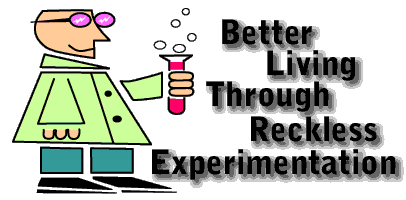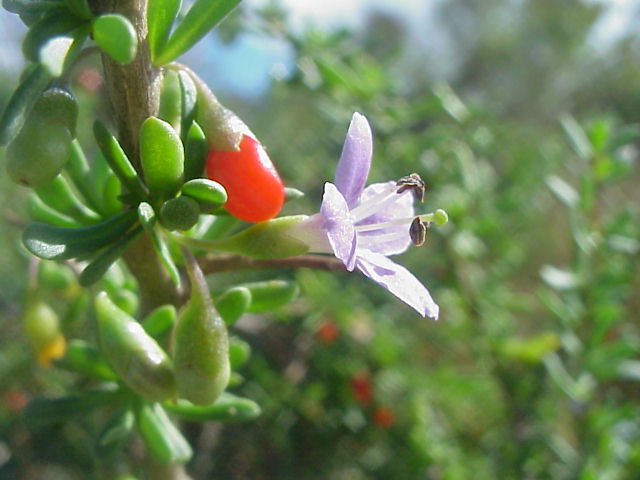

Almost all gardeners and amateur horticulturists practice experimental gardening at some level. Trying a new pest repellent, comparing two varieties of roses, assessing a new method of raising seedlings or establishing cuttings; each of these is an experiment. If properly conducted all may yield valuable information for the gardener himself as well as others.
You probably already have one or more special interests such as growing fruit, orchids or African violets. You will discover even greater pleasure if you can find an organization of individuals that share these interests. Browse through the List of Organizations to find one or more that suit you. Some even have a presence on the internet. Associating with one or more of these groups will widen your horizons and stimulate your interest and your imagination.
RECORD KEEPING is perhaps the simplest yet most valuable tool any gardener can use. A general purpose notebook can be used to record dates of planting, weather conditions, flowering and ripening dates, unusual conditions, general observations, anything that may be significant and that you may want to remember. No matter how good your memory may be, it will fail you when you need it most. That's a guarantee. Written records will always allow you to recall what you recorded and what you were thinking at the time. I keep special notebooks for each project I am involved with and additional ones for general greenhouse notes and gardening observations. You could also use your computer. A word processor, special journal software or a database can be organized to suit your needs. There is also gardening software available that may be useful.
Search these software sites for garden related software. Use search terms such as GARDEN or PLANT or SEED: SHAREWARE.COM VSL
 A
portable tape recorder can be used to verbally record field notes to be transferred
later into a notebook or computer.
A
portable tape recorder can be used to verbally record field notes to be transferred
later into a notebook or computer.
For a look at a real experimenter's notebook check out this article: The Laboratory Notebooks of Thomas Edison; by Neil Baldwin; Scientific American; October 1995 pp160-163.
Edison documented EVERYTHING he did. This was a factor in his high productivity as an inventor and is a valuable resource for researchers today. Failure to remember and understand the past dooms us to repeat the same mistakes and retards true progress.
A good starting point to learn about gardening experimentally is Carol Deppe's book Breed Your Own Vegetable Varieties(1993, Little Brown). Though this book focuses on vegetables, it is well written and much of the information can be used in ornamental and fruit crops as well as vegetables and it has some excellent Appendices. Another helpful book that has a more general focus is Improve Your Gardening With Backyard Research by Lois Levitan and published by Rodale Press (1980). Unfortunately it is currently out of print, but you may find a copy in a used book store or you can get a copy from your local library's InterLibrary Loan if they don't have a copy of their own.
![]()
![]() Experimental Gardening
Notebook
Experimental Gardening
Notebook
Brief essays designed to assist you in carrying out your horticultural experimentation.
![]() Planning and Conducting your Project.
Planning and Conducting your Project.
![]() The
Importance of Control(s)
The
Importance of Control(s)
![]()
![]() The
African Violets Page may suggest projects
that could be conducted indoors on a window sill.
The
African Violets Page may suggest projects
that could be conducted indoors on a window sill.
![]() The
Vegetable Improvement Center
The
Vegetable Improvement Center
![]() Peters'
Seed and Research A
very small unusual seed company operated by Tim Peters who produces many of
the varieties offered by himself. You can purchase seed from lines of breeding
material to get a head start on breeding your own vegetable varieties or if
you just like seeing a preview of what the future holds for the vegetable garden.
Well worth browsing his online catalog.
Peters'
Seed and Research A
very small unusual seed company operated by Tim Peters who produces many of
the varieties offered by himself. You can purchase seed from lines of breeding
material to get a head start on breeding your own vegetable varieties or if
you just like seeing a preview of what the future holds for the vegetable garden.
Well worth browsing his online catalog.
![]() The
Vegetable Improvement Newsletter Archive The
Vegetable Improvement Newsletter (VIN) was started in 1959 by the Committee
on Vegetable Breeding and Varieties of the American Society for Horticultural
Science. VIN was intended as a vehicle to facilitate the exchange of information
and seed stocks among individuals concerned with the breeding or testing of
new varieties of vegetables. VIN regularly contained sections on research notes,
variety announcements, stocks available, and stocks desired.
The
Vegetable Improvement Newsletter Archive The
Vegetable Improvement Newsletter (VIN) was started in 1959 by the Committee
on Vegetable Breeding and Varieties of the American Society for Horticultural
Science. VIN was intended as a vehicle to facilitate the exchange of information
and seed stocks among individuals concerned with the breeding or testing of
new varieties of vegetables. VIN regularly contained sections on research notes,
variety announcements, stocks available, and stocks desired.
![]() CSIRO
GRAPEVINE SERVER (CGS)An Australian
site with a lot of info related to grape growing and current research. It includes
an interesting section on Ampelography which is a term used to describe the
identification of grapevines based on morphology. An interesting project might
be to develop a catalog of grape varieties based on leaf shapes. Are there any
other crops that might be identifiable this way?
CSIRO
GRAPEVINE SERVER (CGS)An Australian
site with a lot of info related to grape growing and current research. It includes
an interesting section on Ampelography which is a term used to describe the
identification of grapevines based on morphology. An interesting project might
be to develop a catalog of grape varieties based on leaf shapes. Are there any
other crops that might be identifiable this way?
If your interest is in orchids, check
out ![]() The
Kew Gardens Orchid Research Newsletter.
The
Kew Gardens Orchid Research Newsletter.
Daylilies are an attractive research plant.
They are easy to breed and quickly yield results. One source of daylily info
is ![]() Daylilies
Online which has many additional links.
Daylilies
Online which has many additional links.
![]() ARS
NEWS Agricultural Research Service News.
A source of the latest research in agriculture and horticulture. A news
archive is also available here.
ARS
NEWS Agricultural Research Service News.
A source of the latest research in agriculture and horticulture. A news
archive is also available here.
![]() ECHO
- Educational Concerns for Hunger Organization. A non-profit group in
Fort Meyers Florida working to assist overseas workers and missionaries to bring
improved food production to impoverished areas of the world. There is an excellent
encyclopedic catalog of warm climate plants with food potential.
ECHO
- Educational Concerns for Hunger Organization. A non-profit group in
Fort Meyers Florida working to assist overseas workers and missionaries to bring
improved food production to impoverished areas of the world. There is an excellent
encyclopedic catalog of warm climate plants with food potential.
![]() NEW
CROPS at Purdue University is full of information about new, undeveloped
crops.
NEW
CROPS at Purdue University is full of information about new, undeveloped
crops.
![]() California
Rare Fruit Growers focuses
on amateur growing and research of fruit crops that can be grown in all areas
of California and beyond.
California
Rare Fruit Growers focuses
on amateur growing and research of fruit crops that can be grown in all areas
of California and beyond.
![]() North American Fruit Explorers
Similar
to the CRFG, but the 3000 members are more focused on temperate fruits. Also
has links to other amateur fruit groups.
North American Fruit Explorers
Similar
to the CRFG, but the 3000 members are more focused on temperate fruits. Also
has links to other amateur fruit groups.
![]() Agricultural
Research Service Germplasm Resources USDA
new crop resource information.
Agricultural
Research Service Germplasm Resources USDA
new crop resource information.
![]() Internet
Directory for Botany -An
amazing list of anything botanical available on the Internet. Really Good.
Internet
Directory for Botany -An
amazing list of anything botanical available on the Internet. Really Good.
![]()
![]() RETURN
to my HOME PAGE
RETURN
to my HOME PAGE
Last edited on 8 April 2001 ©2000,2001 by Dan Sorensen